User-generated content (UGC) has transformed how brands build trust, engage with customers, and drive sales. Happy customers can be your very best marketers, and they’re also the cheapest! People trust recommendations from their peers more than any other form of content, and that’s exactly what UGC offers: social proof straight from real customers.
In this guide, I’ll explain the meaning of user-generated content, why it matters for your brand, and how to use it to grow your business. I’ll also share and analyze a few examples of how different companies use UGC. From collecting customer photos to featuring reviews on your website, UGC can enhance every stage of your marketing strategy and build stronger connections with your audience.
- What Is User-Generated Content (UGC)?
- Why UGC Is Important for Your Brand
- 3 User-Generated Content Examples
- Best Practices for Gathering & Using UGC
What Is User-Generated Content (UGC)?
User-generated content (UGC) is any promotional content that is created and shared by individuals rather than brands. With UGC, real-life customers and fans promote your product or service by sharing photos, reviews, testimonials, and videos of their own experiences.
UGC has a long history in digital marketing, and its importance has continuously grown and evolved. Way back in 2009, Burberry launched their “Art of the Trench” campaign. They asked real customers for photos of themselves wearing the brand’s signature trench coat, and Burberry featured these photos on their website and Facebook page.
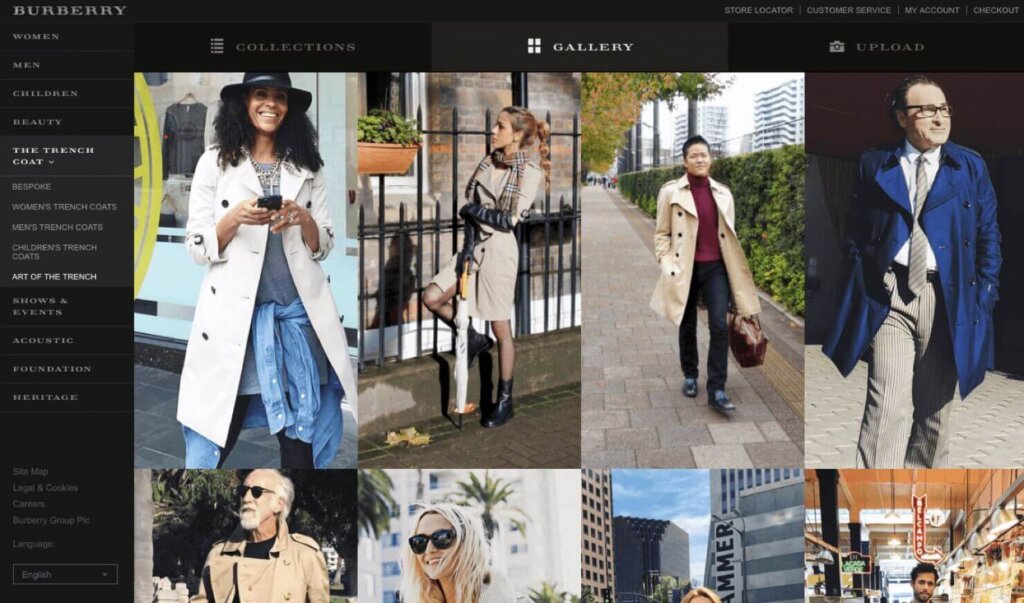
The campaign was extremely successful. It contributed to a 50% increase in ecommerce sales and helped Burberry reach 1 million Facebook followers.
UGC is so valuable because it comes from real users who have no obligation to promote your business. That makes their endorsements more genuine and relatable. It also makes consumers part of your brand story, which increases engagement and makes them feel more connected to your brand.
Types of User-Generated Content
UGC can come in many different forms. Here are some of the most common types of UGC:
- Photos and videos: Customers sharing pictures of themselves using your product or recording video reviews.
- Social media posts: Posts from users, often with branded hashtags, that recommend your products or services.
- Reviews and testimonials: Written feedback on product pages or 3rd-party platforms like Yelp, Google, and Trustpilot.
- Blog posts: Detailed articles written by users, either on personal blogs or as guest posts, that discuss your products or brand.
- Forum posts and comments: Conversations and discussions on platforms like Reddit, where customers share experiences or recommendations.
To optimize your UGC strategy, encourage your customers to create a variety of content types and find ways to feature that UGC on your website and social media channels.
Why UGC Is Important for Your Brand
Your brand needs to invest in UGC for one important reason: the power of social proof.
Social proof is simply the idea that people look to others when making decisions. In marketing, it means that consumers want to know that other people are buying and enjoying your products. Social proof makes shoppers feel more confident about clicking that “Buy Now” button, and UGC is pivotal to providing that confidence.
Master Social Proof in Your Marketing Strategy
See our complete guide to using social proof to win sales and grow your business!
Why USG Matters: A Common Use Case
Let’s say your company sells UV-protecting beachwear. One of your customers makes a social media post about the new swimsuit coverup they bought from your company for their vacation. One of their friends sees that post, and it catches their attention because they also have a beach trip coming up.
That friend then Googles your brand. They see video results of customers unboxing and reviewing your products. They also see Reddit discussions where users recommend your products as the best choice for UV-protective clothing.
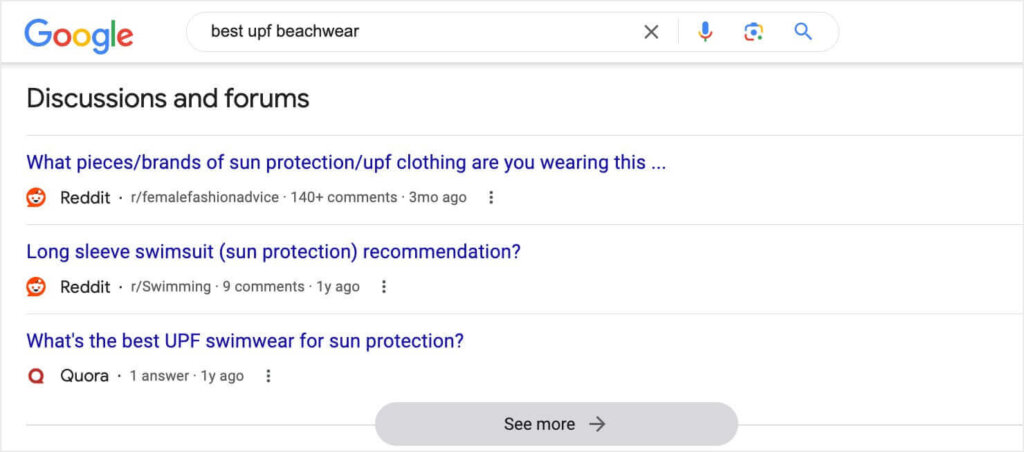
When the shopper visits your website’s homepage, they see a live social media feed of customers who use your hashtag. The feed is full of photos of people happily and safely enjoying the sun while wearing your products. As the shopper continues to browse, customer reviews are displayed prominently on every product page. Some of those reviews include photos, so the shopper can see how your products look on different body types. The shopper selects a product, figures out their size, and places an order.
User-created content encouraged this shopper through every stage of the customer journey. From initial brand awareness to the final decision to purchase, they saw social proof that your product was the right choice for them.
While this is a hypothetical example, you’ve probably had a similar experience when deciding to buy from a new brand. For the vast majority of online shoppers, UGC is an integral part of reaching and converting your target audience.
Data-Backed Benefits of UGC
Let’s move away from the hypothetical and talk about hard data. Here are some statistics that prove the effectiveness of UGC.
Stackla (now Nosto) conducted a survey of 2,042 consumers to track post-pandemic shifts in shopping habits. Here’s what they found:
- 79% of people say UGC highly impacts their purchasing decisions. Compare this number to brand-created content at 12% and influencer-created content at 9%.
- 66% of consumers have purchased from a new brand after seeing consumer-posted images on social media
Stackla breaks that last number down into generational categories. UGC images have a greater impact on younger Gen Z consumers, with 73% saying they’ve bought from a new brand because of them.
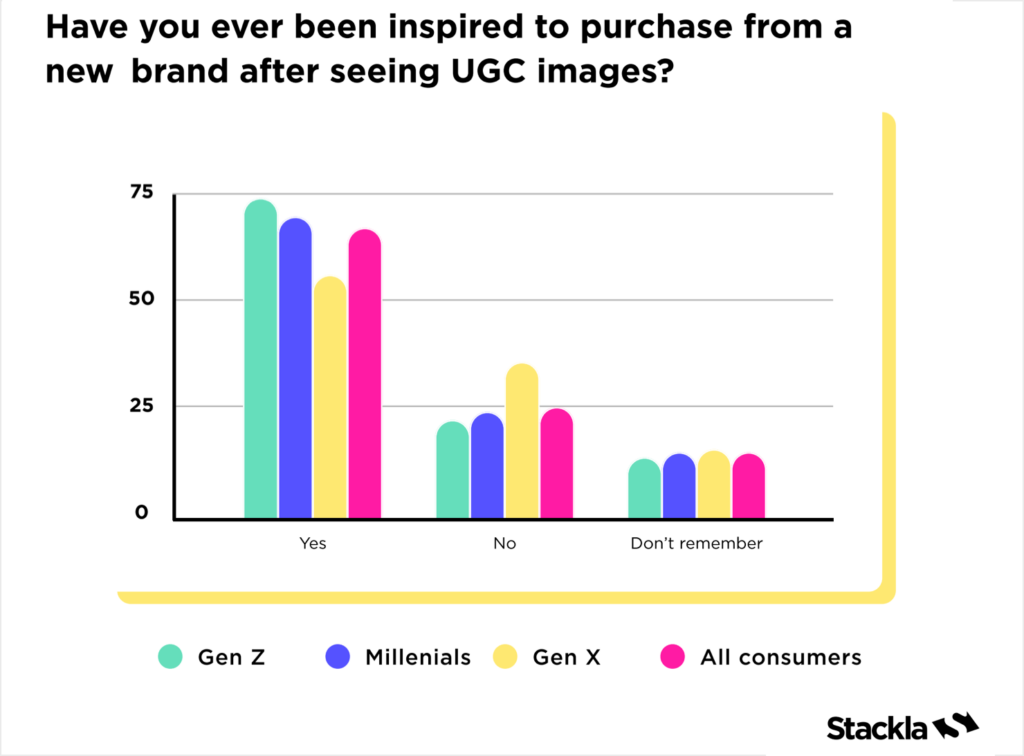
Not only is UGC driving purchases, but it’ll likely become even more important as Gen Z gains more purchasing power.
That study isn’t a fluke. Here are some more findings from a 2022 report by Yotpo on UGC:
- 52% of shoppers are more likely to purchase if they see positive reviews on social media.
- 50% of consumers are more likely to purchase an item if reviews and other USG are displayed throughout the brand’s site.
- 63% of consumers trust product reviews more if they include photos or videos.
In short, user-created content has undeniable benefits for businesses and marketers. It turns your customers into your biggest advocates, and it helps you earn the trust of shoppers who are still deciding whether to buy from your company.
3 User-Generated Content Examples
1. Instagram Hashtag UGC Campaign by Maurices
The women’s clothing brand Maurices encourages customers to post their new outfits on Instagram using the hashtag #discovermaurices. This successful UGC campaign has yielded over 315,000 Instagram posts.
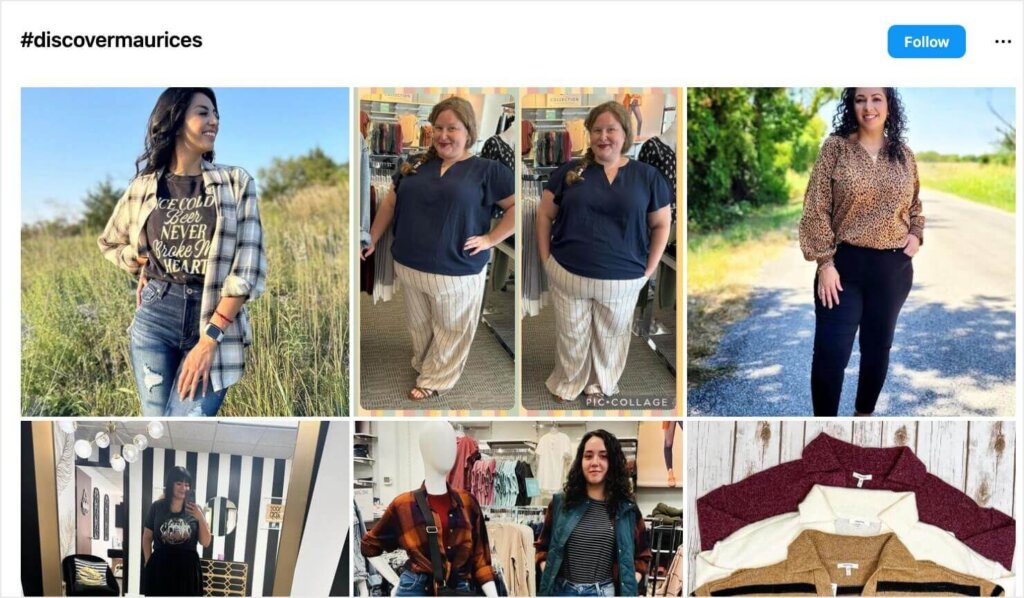
Maurices’ customers have made well over a quarter-million posts promoting the company’s products. That’s a lot of free advertising!
In fact, Maurices’ own Instagram page has only posted about 7,000 times, so this UGC campaign has increased their social media presence 45x.
Maurices makes the most of this customer-generated content, featuring some of the Instagram photos on the homepage of their website.
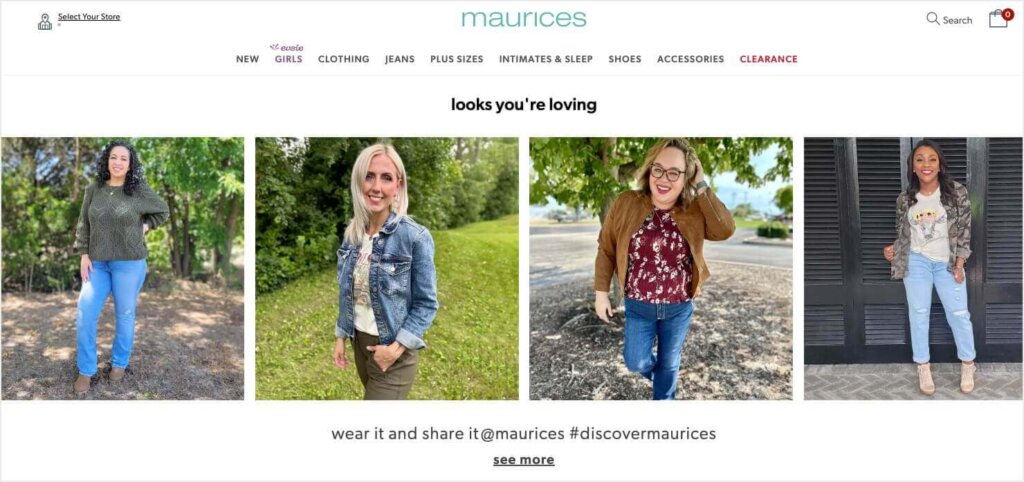
That means every online shopper sees real-life examples of customers enjoying the brand’s clothes. Shoppers also learn that they, too, could be featured if they make their own UGC posts with the hashtag.
Add UGC Instagram Feeds to Your Website!
Sign up for Instagram Feed Pro by Smash Balloon, and show website visitors what they’re missing!
2. Reviews & Customer Photos on Etsy
When people shop on Etsy, an online marketplace for handmade products, they depend heavily on reviews. Etsy has over 6 million active sellers, so shoppers rely on UGC to determine the trustworthiness of sellers and the quality of the products.
On every Etsy product page, you can view reviews for that specific item or all reviews for that seller.
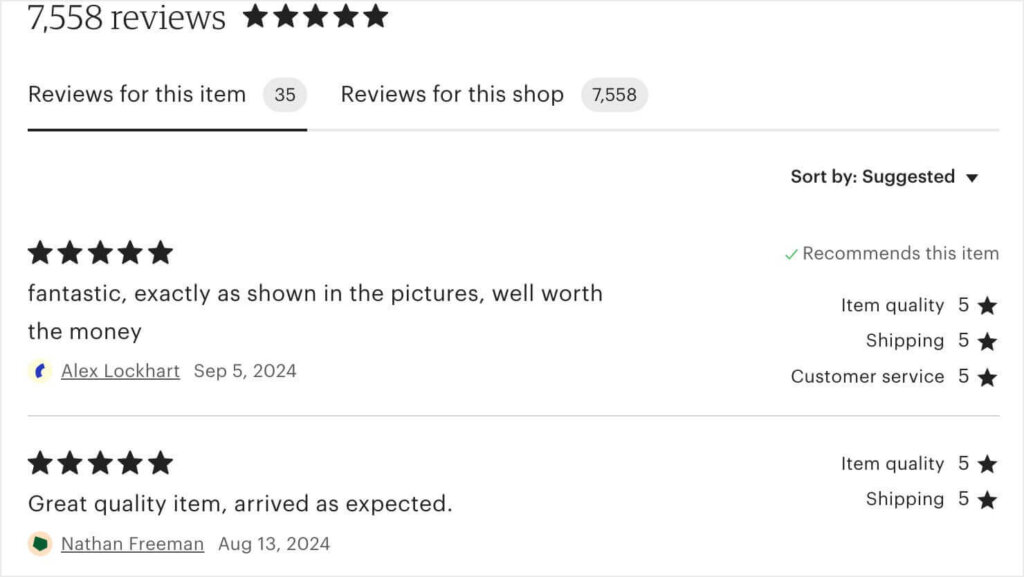
Etsy also allows customers to upload photos with their reviews, so shoppers can see exactly what the items actually look like. Each product page includes a gallery of customer photos.
For example, here’s the photo gallery for a shop that sells downloadable 3D printing files. These UGC photos show the results that customers have gotten when they printed the files:

Users can click each image to access its accompanying review. In this review for a customizable leather sign, visitors can see exactly what the final results look like:
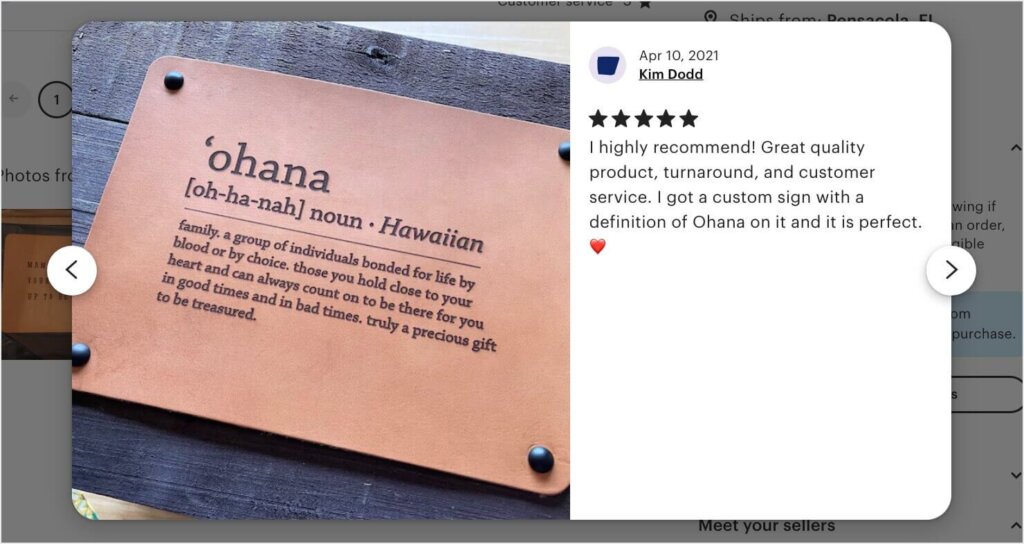
Etsy is full of small businesses, startups, and individual sellers trying to win shoppers’ trust. UGC reviews and photos help accomplish this goal, by proving that other real customers are happy with their purchases.
3. UGC Testimonials for OptinMonster
Here at OptinMonster, we regularly collect testimonials from our customers. Those testimonials share real-life stories of how our lead-generation software has helped business grow their email lists and increase sales. Here’s an example of an OptinMonster testimonial from digital marketing expert Neil Patel:
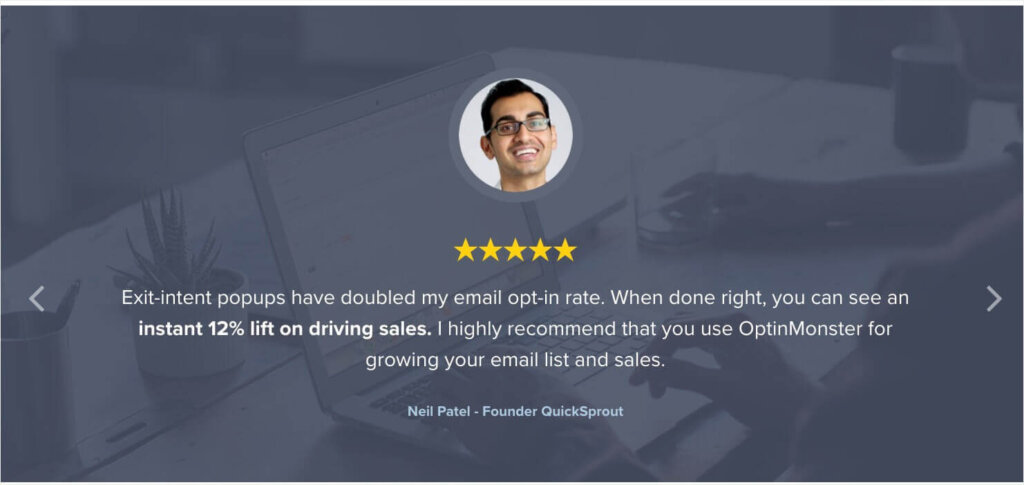
We feature these testimonials heavily throughout our website. For example, we have a dedicated testimonial page:
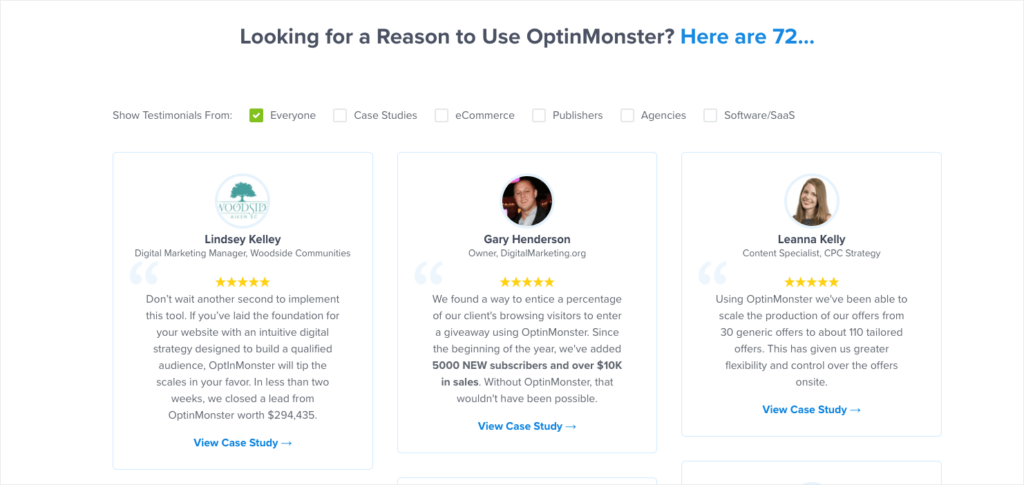
We also showcase a testimonial right at the top of our pricing page:
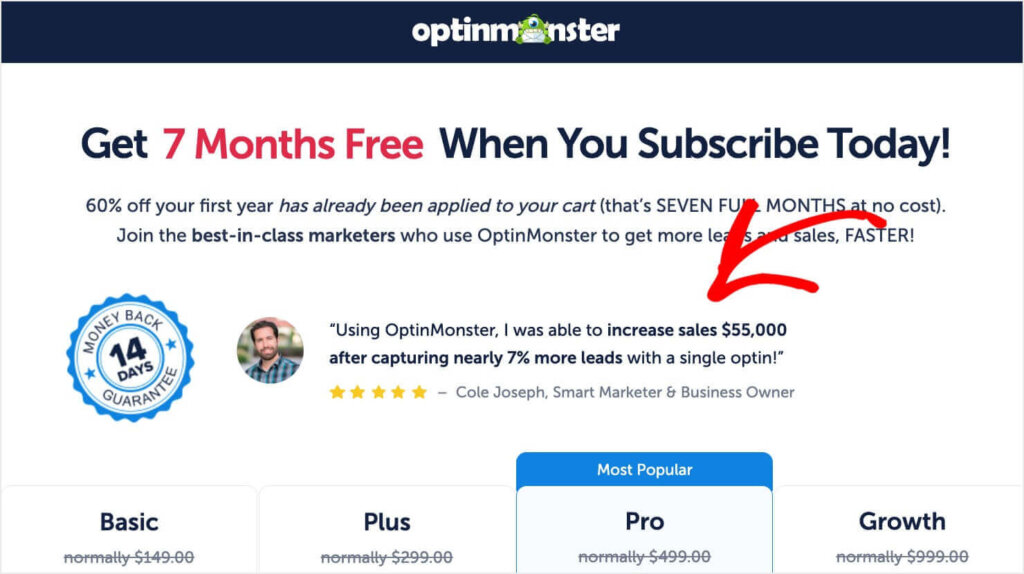
We also regularly include testimonial quotes in our Exit-Intent® popups, such as this one:
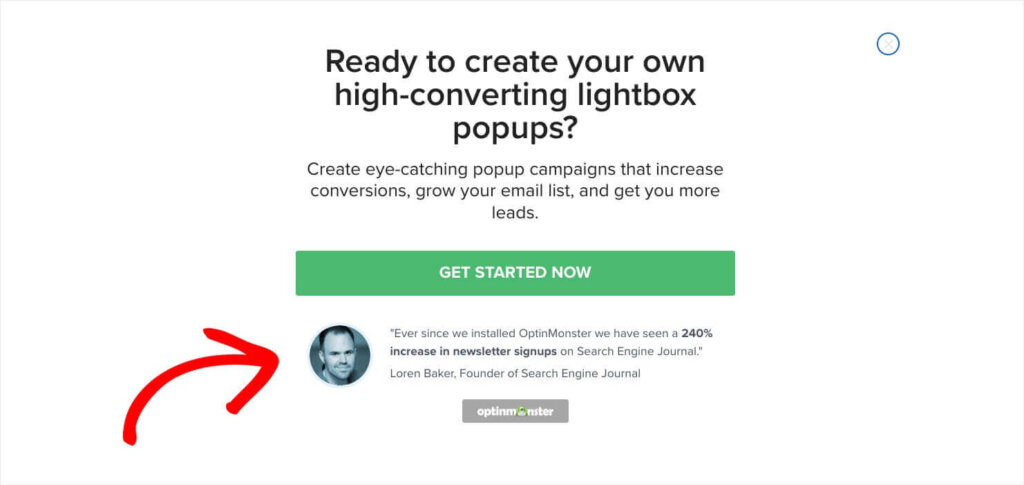
When potential customers browse our site, they constantly see strong social proof of our product’s quality and benefits. This UGC has worked, helping OptinMonster grow to over 1.2 million users.
Want to learn more about testimonials? Check out these 2 articles:
- How to Ask for a Testimonial: 7+ Tips to Get Glowing Customer Quotes
- 10 Creative Examples of Testimonials to Win Customers
Best Practices for Gathering and Using UGC
Now that you understand the value of user-generated content, it’s time to implement a solid strategy for gathering and leveraging it. A well-planned UGC campaign can help you boost brand awareness, drive engagement, and build trust through authentic social proof. Here are some best practices to help you maximize the impact of UGC.
1. Set Clear Goals for Your UGC Campaign
Before launching a UGC campaign, you need to define your objectives. Is your goal to raise brand awareness, promote a new product, or increase subscribers? Knowing your goals will help you create a campaign that resonates with your audience and meets your marketing needs.
For example, if you’re looking to grow your social media presence, you could encourage customers to share their experiences using your product with a specific hashtag. This not only generates UGC but also boosts your visibility on platforms like Instagram, X (formerly Twitter), and TikTok.
If you’re focused on conversions, consider including customer-generated content throughout your website to build trust. Display customer photos, reviews, and testimonials on key landing pages.
2. Ask for UGC on Your Website
Your customers are already shopping on your site, so take advantage of that opportunity to ask for user-generated content.
By strategically prompting customers during their shopping journey, you can collect valuable UGC that builds trust and drives sales. Here are a few tips to get more UGC through your website:
- Include Review Requests on Product Pages: Allow customers to leave reviews and upload photos directly on your product pages. This is an easy way to gather authentic user feedback and real-life visuals of your products. Adding photos to reviews can boost trust even further. Be sure to feature a prominent “Write a Review” or “Upload a Photo” button to make it simple for users to contribute.
- Incorporate Call-to-Action Banners: Add a call-to-action (CTA) banner on your website inviting users to share their experiences. For example, a banner could say “Bought this product? Share your photo and get featured on our site!” This gentle nudge can motivate customers to submit UGC either through social media or directly on your site. You can create a banner in minutes with one of OptinMonster’s floating bar templates
- Use Post-Purchase Popups: After a customer makes a purchase, they’re at the peak of their positive experience. With OptinMonster, you can create post-purchase popups that encourage customers to submit UGC directly on your website or share it on social media with a branded hashtag.
OpinMonster has a popup template that’s perfect for getting short customer testimonials:
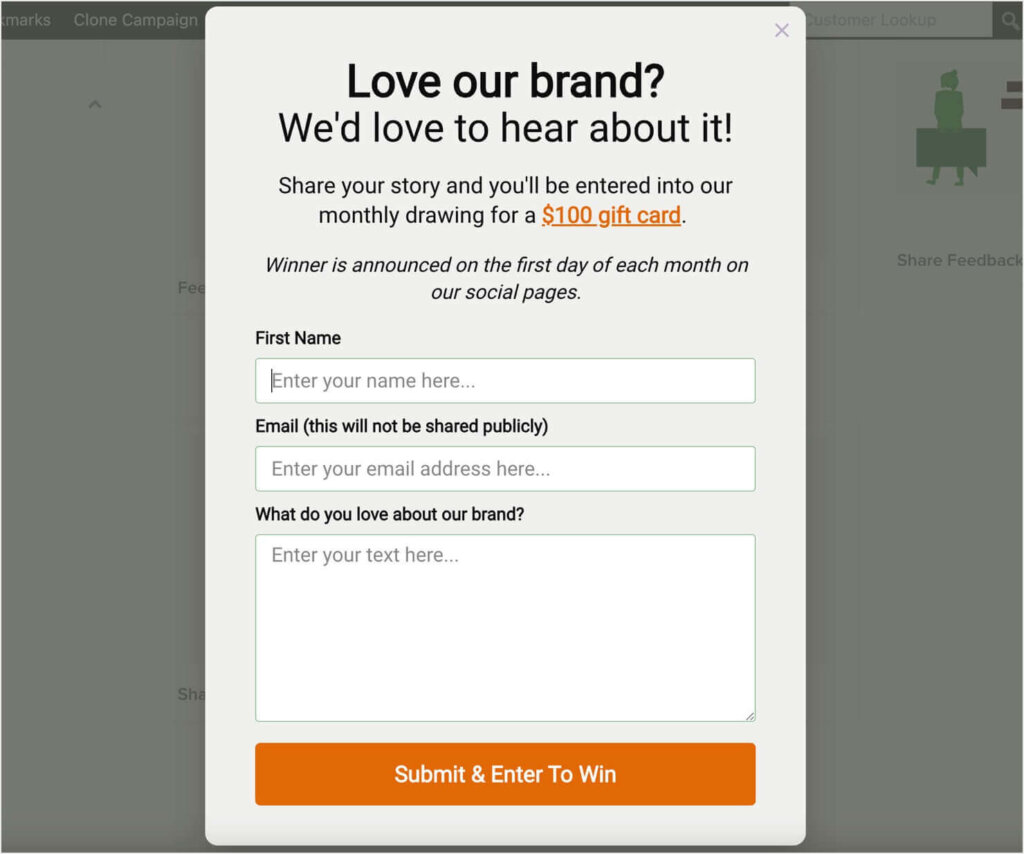
This is just one of OptinMonster’s 700+ pre-made templates, which you can easily customize in our drag-and-drop builder.
3. Use Email Marketing to Get UGC
Email marketing is one of the most effective tools for nurturing your customers and building long-term relationships. It’s also an excellent way to gather user-generated content from happy customers. Here are some strategies to encourage UGC through email marketing:
- Send Post-Purchase Emails: After a customer has made a purchase, follow up with a post-purchase email asking them to share their experience. Timing is key here. Send the email after they’ve had a chance to use the product, and include a direct call-to-action (CTA) asking them to submit a review, upload a photo, or share a testimonial. For example, your email could say, “Loved your purchase? Share a photo of your new [product] and tag us on Instagram to get featured!” You can even incentivize the request by offering a discount or small reward for sharing.
- Include a Review Request in Your Follow-Up Emails: If a customer hasn’t shared a review or UGC after their initial purchase, include a gentle reminder in your follow-up emails. These emails can remind them how valuable their feedback is to your brand and can include a quick link to submit a review or upload a photo.
- Feature User-Generated Content in Your Emails: Featuring UGC in your marketing emails can inspire other customers to contribute their own content. For example, include a section in your email showcasing photos or reviews from real customers. Then add a CTA encouraging readers to submit their own UGC for a chance to be featured. Seeing how other customers are recognized will motivate your subscribers to participate as well.
Learn How to Grow Your Email Marketing List!
Check out our guide: How to Get More Email Subscribers (17 Proven Tips!)
4. Run UGC Contests and Giveaways
Contests are an excellent way to incentivize UGC. By offering a prize, you encourage users to participate, creating a sense of excitement around your brand. The best part? You can gather a lot of high-quality content from your customers in a short period.
RafflePress, the leading WordPress giveaway plugin, makes it simple to host UGC contests.
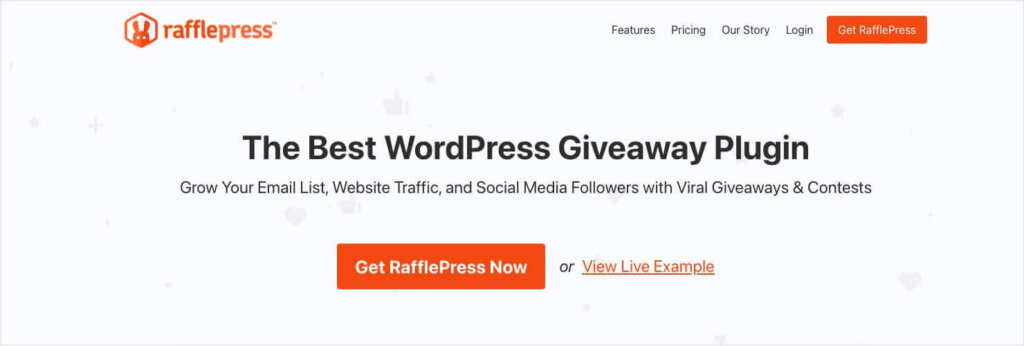
With its Image Submission feature, participants can easily upload their photo entries, and you can manage submissions from your dashboard. It’s the easiest way to run viral contests that generate UGC.
Start Hosting Contests with RafflePress!
5. Feature User-Generated Content on Your Website
Now that you’ve gathered all this valuable UGC, it’s time to show it off! When potential buyers see real people using and enjoying your products, it provides powerful social proof that can drive sales. If you run an eCommerce store, make sure that your reviews are displayed prominently on all product pages. For other online businesses, you should feature testimonials on high-profile pages, such as your pricing page or subscription page.
If you really want to highlight your customer-generated content, Smash Balloon has a suite of WordPress plugins that let you easily embed social media and review feeds on your website.
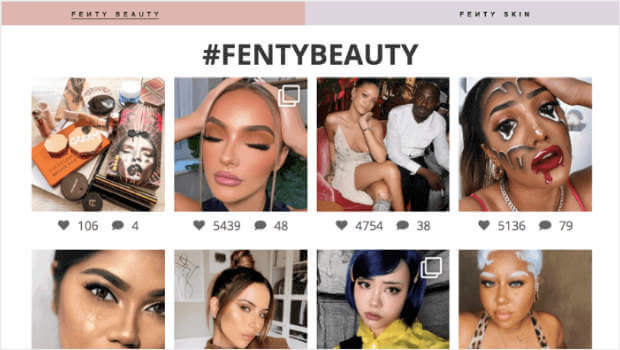
These plugins include:
- Facebook Feed Pro: Display Facebook reviews and community posts right on your website.
- Instagram Feed Pro: Set up hashtag feeds to promote your UGC campaigns.
- Twitter Feed Pro: Embed X feeds based on hashtags or search terms
- Reviews Feed Pro: Create a feed of 3rd party reviews from platforms like Google, Yelp, TrustPilot, WordPress.org, TripAdvisor, and Facebook.
Learn more about these plugins in my complete Smash Balloon review. Then, you can choose to purchase the All Access Bundle or select 1 or 2 of these plugins.
Show Off Your UGC With Smash Balloon!
6. Always Get Explicit Consent Before Sharing
When gathering UGC, always ensure that you have the proper permissions to use and share customer content. Tools like SmashBalloon display feeds directly from the social media sites that users are posting to, so you don’t have to worry about asking permision.
However, if you’re going to share the UGC in other ways, you should always get explicit permission first.
For example, if you use an OptinMonster popup to ask for a testimonial, you can add a checkbox that says something like:
I agree that [brand name] can use my comment and first name for marketing
Alternatively, you can require an email address, so you can ask permission in a follow-up email.
Grow Your Business With User-Generated Content
User-generated content is one of the most powerful marketing tools available to brands today. It turns your customers into marketers, and it builds credibility, increases engagement, and drives sales. By incorporating UGC throughout your website, emails, and social media, you give potential customers the reassurance they need to choose your product.
Thankfully, there are several tools available to help you gather and showcase your UGC:
- Ask for reviews and testimonials with onsite popups from OptinMonster
- Use RafflePress to host UGC giveaways
- Embed UGC feeds on your website with Smash Balloon
- Add testimonials to your OptinMonster Exit-Intent® popups to convince abandoning visitors to complete their purchase
Related Resources:

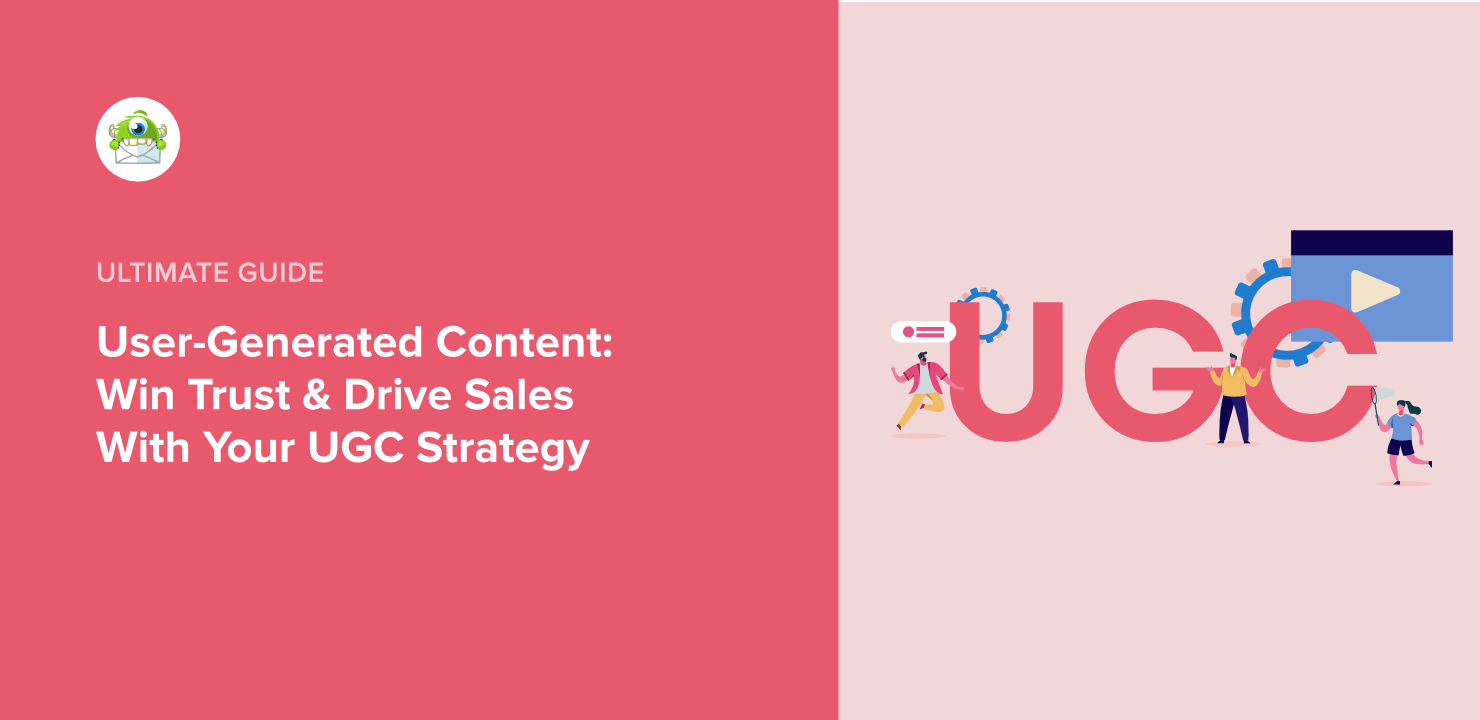
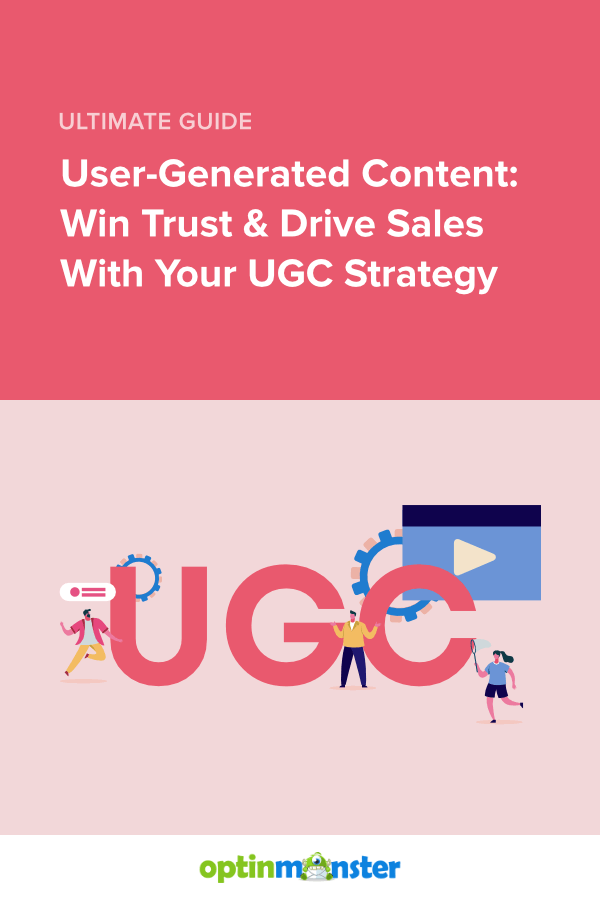


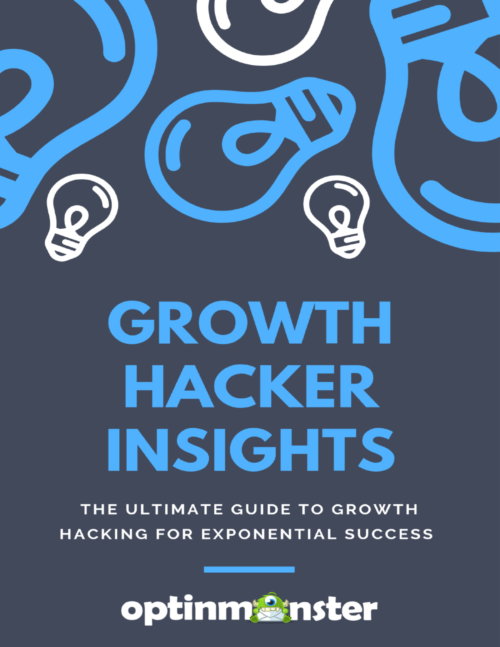
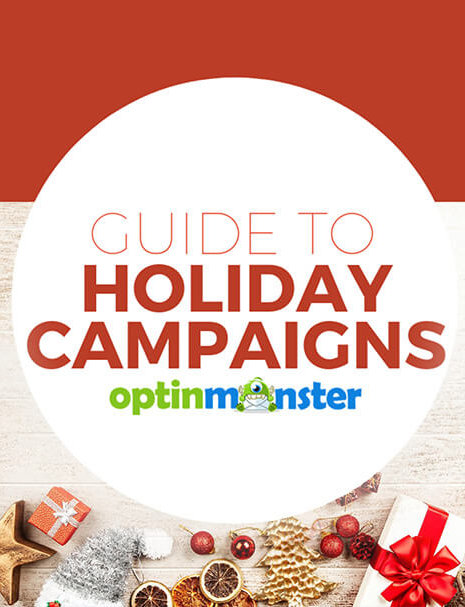
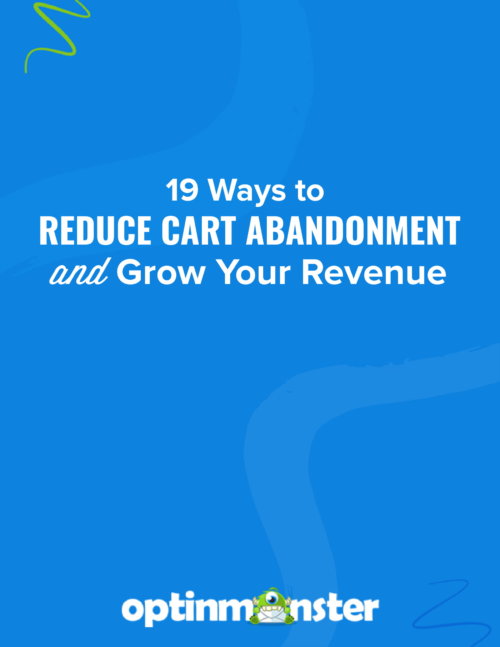



Add a Comment